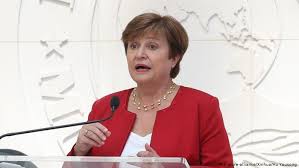The Managing Director of International Monetary Fund (IMF), Ms. Kristalina Georgieva, has predicted that the world economic growth will dip below three per cent during 2023 and is likely to stay at that level for the next five years.
The IMF boss made this forecast on Thursday during a prepared speech while visiting Washington DC in advance of the IMF member spring meetings next week.
Georgieva, who noted that global growth in 2022 declined by almost half, from 6.1% to 3.4 % and that what the modest growth achieved already in 2023 was the result of “resilient labour markets and strong consumer spending”, recalled that after a strong recovery in 2021 “came the severe shock of Russia’s war in Ukraine and its wide-ranging consequences for global economies.
According to her, despite some slight growth following China’s reopening after Covid-19, the world economy would grow less than three per cent in 2023.
Georgieva said: “Growth remains weak by historical comparison – both in the near and medium term. There are also stark differences between country groups.
“Some momentum comes from emerging economies—Asia especially is a bright spot. India and China are expected to account for half of global growth in 2023.
“Economic activity is slowing in the United States and the euro area, where higher interest rates weigh on demand. About 90 per cent of advanced economies are projected to see a decline in their growth rate this year.
“We project global growth to remain around 3 percent over the next five years – our lowest medium-term growth forecast since 1990, and well below the average of 3.8 percent from the past two decades.
“With rising geopolitical tensions and still-high inflation, a robust recovery remains elusive. This harms the prospects of everyone, especially for the most vulnerable people and countries”, she added.
The development finance expert maintained that it would be difficult to see robust growth without price stability or without financial stability.
The IMF boss said that the IMF expected central banks to stay the course in the fight against inflation, holding a tight stance to prevent a de-anchoring of inflation expectations.
She canvassed: “At the same time, they should address financial stability risks when they emerge – through appropriate provision of liquidity. The key is to carefully monitor risks in banks and non-bank financial institutions, as well as weaknesses in sectors such as commercial real estate.”
Speaking on what could be done to improve medium-term prospects for growth, Georgieva said this can be achieved “by accelerating the digital revolution, improving the business environment, and boosting human capital and inclusion.”




